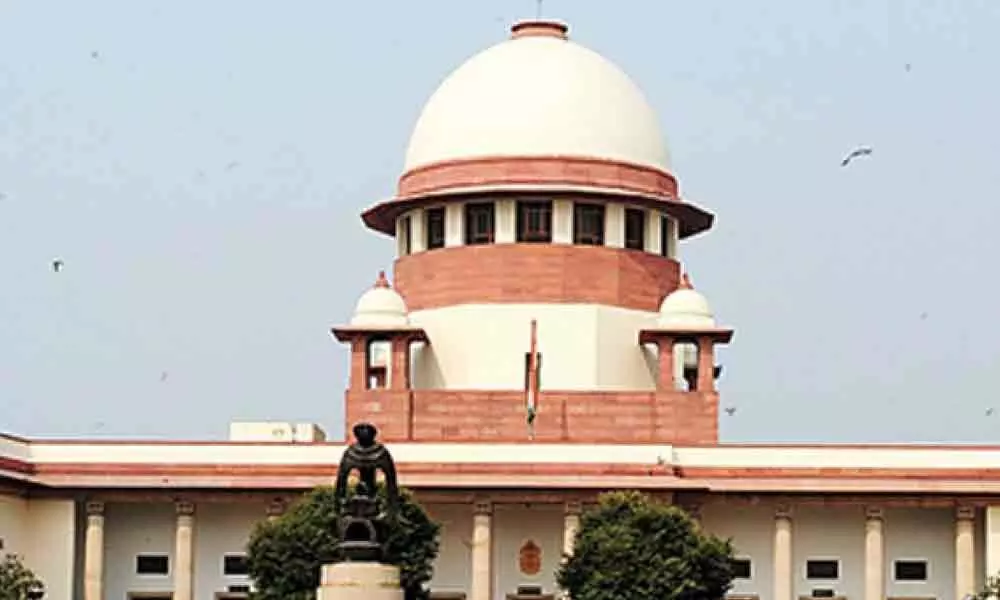Live
- Congress demands Amit Shah’s scalp, holds massive protest in Hyderabad
- Visakhapatnam: Spiritual meeting today
- SSC exam fee date extended
- Govt expedites Phase-I of scheme
- Remarks Against Ambedkar: Congress demands Union Home Minister Amit Shah’s resignation
- Decision likely on 2-child policy for rural body polls after caste census
- 2.79 lakh MTs of paddy purchased in Eluru dist
- MLA GV Anjaneyulu visits rain-hit agriculture fields
- Cyberabad sees 64 per cent Surge in Crime Rate
- Maternal Deaths: Collector O Anand expresses ire over medical staff
Just In
Sort of settlement, says sources on report by Ayodhya mediation panel


The Supreme Court-appointed mediation panel to resolve the Ram Janmbhoomi-Babri Masjid land dispute in Ayodhya is believed to have filed a report in the apex court on Wednesday in a sealed cover which sources said is a "sort of a settlement" between the Hindu and the Muslim parties.
New Delhi: The Supreme Court-appointed mediation panel to resolve the Ram Janmbhoomi-Babri Masjid land dispute in Ayodhya is believed to have filed a report in the apex court on Wednesday in a sealed cover which sources said is a "sort of a settlement" between the Hindu and the Muslim parties.
Sources close to the mediation panel said the Sunni Waqf Board, Nirvani Akhada, Nirmohi Akhada, Ram Janmabhoomi Punruddhar Samiti and some other Hindu parties are in favour of settling the contentious land dispute.
The panel is headed by former apex court judge FMI Kalifulla and also comprises spiritual guru and founder of the Art of Living foundation Sri Sri Ravi Shankar and senior advocate and renowned mediator Sriram Panchu. Ravi Shankar tweeted, "I thank the Supreme Court for the confidence they have placed in the mediation. I thank all the parties for their sincere and tireless participation. The entire mediation process happened with a sense of brotherhood and understanding which is a testament to the values of this nation".
Sources said the parties have sought settlement under the provisions of The Places of Worship Act, 1991 which provides that no dispute with regard to any mosque or other religious places, which have been constructed after demolition of temples and are existing as in 1947, would be raised in a court of law. The Act, however, excludes the Ram Janmabhoomi-Babri Masjid dispute from its purview.
Sources said Muslim parties have suggested that the land in question can be given in acquisition to the government, and the Waqf Board can submit a select list of ASI mosques which can be made available to them for prayers.
A senior advocate appearing in the dispute in the apex court said since the hearing has concluded, the report which the media is speaking about, has no value. Some of lawyers appearing for both the Hindu and Muslim sides, said they have not been informed by the apex court about the filing of the report by the panel.
The report, sources said, has taken into consideration the grievances of the Muslim parties that government should take steps to renovate the existing mosques in Ayodhya and a suitable space be provided to them in the religious town to build a mosque.
Further, the sources said that a Hindu religious institution has agreed to part with its land in Ayodhya for construction of mosque there.
On September 16, a fresh plea was made by a Hindu and a Muslim party seeking resumption of the mediation process for amicable settlement of the land dispute in Ayodhya by the mediation panel. The top court Wednesday reserved its verdict in the title dispute after a marathon hearing of 40 days.
Fourteen appeals have been filed in the apex court against the 2010 Allahabad High Court judgment, delivered in four civil suits, that the 2.77-acre land in Ayodhya be partitioned equally among the three parties - the Sunni Waqf Board, the Nirmohi Akhara and Ram Lalla. On December 6, 1992, the Babri Masjid, constructed at the disputed site in the 16th century by Shia Muslim Mir Baqi, was demolished.

© 2024 Hyderabad Media House Limited/The Hans India. All rights reserved. Powered by hocalwire.com






